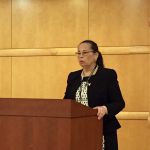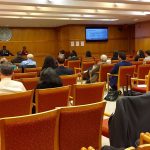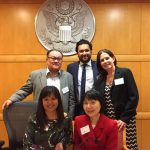Press Release: Asian American Bar Association of New York Applauds New York’s Highest Court for Decision Prohibiting Skin-Color Discrimination in Jury Selection
FOR IMMEDIATE RELEASE
December 28, 2016
Contact: Yang Chen, Executive Director
(212) 332-2478
Asian American Bar Association of New York Applauds New York’s Highest Court for Decision Prohibiting Skin-Color Discrimination in Jury Selection
NEW YORK – On December 22, 2016, the New York Court of Appeals held in People v. Bridgeforth that skin color-based discrimination in jury selection is prohibited under Batson v. Kentucky, the New York State Equal Protection Clause, and the New York State Civil Rights Law. While Batson has long been understood to prohibit racial discrimination, the Court concluded that its holding “extend[s] the application of Batson to challenges based on color to ensure that the jury is not used as a tool to accomplish such discrimination.” As one of many community organizations that co-signed the Fred T. Korematsu Center for Law and Equality (“Korematsu Center”) and Akin Gump’s amicus brief in support of this decision, the Asian American Bar Association of New York (“AABANY”) applauds this decision.
Key to the Court of Appeals’ decision was its recognition that “[d]iscrimination on the basis of one’s skin color – or colorism – has been well researched and analyzed, demonstrating that ‘not all colors (or tones) are equal.’” In so holding, the Court expressly relied on several sources set forth in the amicus brief filed by the Korematsu Center and over 50 bar associations, non-profit organizations, and law school professors in this case. Professor Robert S. Chang, executive director of the Korematsu Center, commented, “We are pleased the Court found the scholarship on the history and effects of color discrimination that were cited in our amicus brief helpful and informative in finding that Batson does apply to color-based challenges under New York law.”
Sherrilyn Ifill, President and Director-Counsel of the NAACP Legal Defense and Educational Fund, Inc. (“LDF”) observed, “The Court of Appeals has taken a significant step towards reducing the impact of color-based discrimination in our justice system. We hope New York’s leadership in this area will encourage other jurisdictions across the country to protect the role of the jury as an instrument of public justice that is truly representative of the community.”
Professor Vinay Harpalani from Savannah Law School, who served as of counsel for amici, applauded the Court of Appeals for “recognizing that Indian Americans, like African-Americans, can face discrimination based on their skin color.” The Bridgeforth case involved a dark-skinned Indian American woman who was excluded from the jury along with several other dark-skinned women.
Attorneys from Akin Gump Strauss Hauer & Feld LLP served as pro bono counsel on the brief. “Akin Gump is proud to represent this national coalition and be part of this resounding victory for justice,” said Alice Hsu, a partner in Akin Gump’s New York office representing the amici.
The Asian American Bar Association of New York (AABANY) is proud to be among the organizations to sign on to the amicus brief. “As the leading bar association for Asian Americans in New York, we supported theamicus brief and we are pleased with the court’s decision,” stated Susan L. Shin, President of AABANY. “Discrimination on the basis of skin color, just as discrimination on the basis of race, should have no place in jury selection and the proper administration of justice.”
In total, 32 law professors and 20 organizations joined the amicus brief, including: the Fred T. Korematsu Center for Law and Equality, the Anti-Defamation League (ADL), Asian Americans Advancing Justice | AAJC, Asian Americans Advancing Justice | Asian Law Caucus, Asian Americans Advancing Justice | Atlanta, Asian Americans Advancing Justice | Chicago, Asian Americans Advancing Justice | Los Angeles, the Asian American Bar Association of New York (AABANY), the Asian American Legal Defense and Education Fund (AALDEF), the Hispanic National Bar Association (HNBA), LatinoJustice PRLDEF, Inc., the Metropolitan Black Bar Association (MBBA), the National Asian Pacific Bar Association (NAPABA), the National Asian Pacific American Women’s Forum (NAPAWF), the NAACP Legal Defense & Educational Fund, Inc. (LDF), the National Bar Association, the National Native American Bar Association (NNABA), the Society of American Law Teachers, Inc. (SALT), the South Asian Bar Association of New York (SABANY), and the South Asian Bar Association of North America (SABA North America).
The Court’s decision can be found here. The amicus brief is available here.
For more information, please contact Yang Chen, AABANY Executive Director, at (212) 332-2478, or direct any inquiries to [email protected].
The Asian American Bar Association of New York is a professional membership organization of attorneys concerned with issues affecting the Asian Pacific American community. Incorporated in 1989, AABANY seeks not only to encourage the professional growth of its members but also to advocate for the Asian Pacific American community as a whole. AABANY is the New York regional affiliate of the National Asian Pacific American Bar Association (NAPABA).
Additional information about AABANY is available at www.aabany.org
Follow our blog at www.blog.aabany.org
Follow us on Twitter at www.twitter.com/aabany
Find us on Facebook at www.facebook.com/aabany
Find us on LinkedIn at www.linkedin.com/in/aabany








